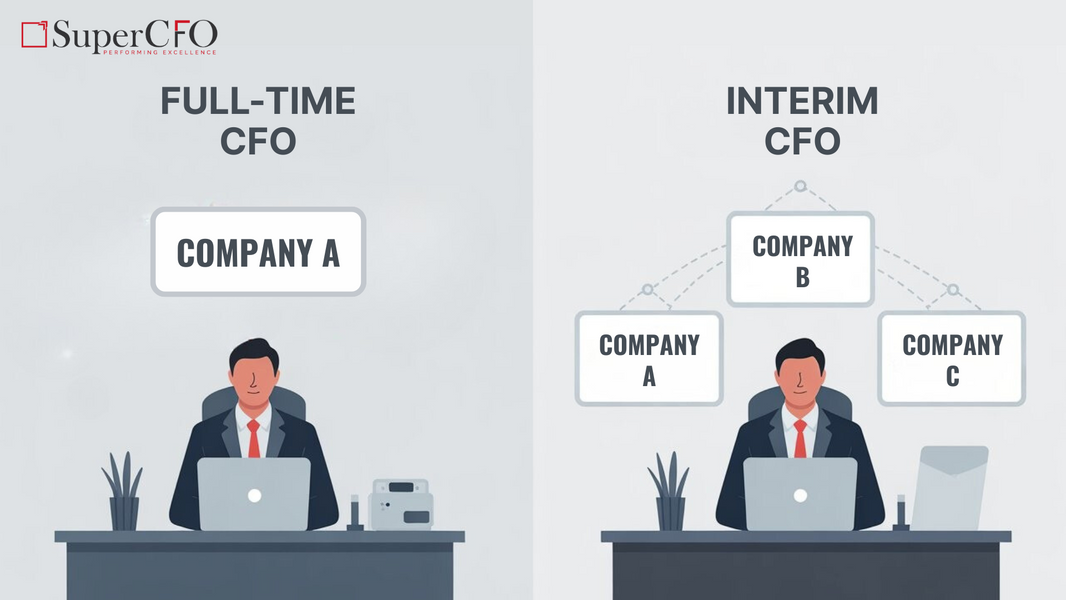Introduction
Every business reaches a point where financial leadership becomes critical. The question is: should you hire a Full-Time CFO or engage an Interim CFO? The right decision can impact not just your balance sheet, but also your growth trajectory, investor confidence, and risk management.
This article unpacks the differences, benefits, and strategic considerations of each option, so you can choose with clarity.
What Does a Full-time CFO Bring?
A full-time CFO is deeply embedded in your company’s DNA. Their role extends beyond financial stewardship to strategic leadership.
Key Advantages of a Full-time CFO:
-
Long-term vision - Aligns financial strategy with the company’s 3-5 year growth plan.
-
Institutional knowledge - Develops a deep understanding of the company’s culture, people, and processes.
-
Stakeholder confidence - Reassures investors, lenders, and boards with stability at the top.
-
Team building - Attracts and mentors finance talent for scalable growth.
Best suited for:
Established enterprises or scaling businesses with complex financial structures, recurring investor interactions, or regulatory obligations that demand constant oversight.
The Value of an Interim CFO
An interim CFO offers agility. They step in to solve specific challenges or bridge leadership gaps without long-term commitment.
Key Advantages of an Interim CFO:
-
Crisis management - Brings immediate expertise during restructuring, M&A, or turnaround.
-
Flexibility - Provides leadership for 3 -12 months without the cost of a permanent hire.
-
Specialised skills - Offers niche experience (e.g., fundraising, IPO prep, ERP rollout).
-
Fresh perspective - Injects unbiased insights and industry best practices quickly.
Best suited for:
Startups, SMEs, or enterprises in transition phases where urgent needs outweigh the requirement for a permanent finance leader.
Strategic Comparison
|
Factor |
Full-time CFO |
Interim CFO |
|
Commitment |
Long-Term |
Short-Term (3-12months) |
|
Cost Structure |
Salary + Benefits + Equity |
Flexible, Project/Retainer-based |
|
Knowledge Depth |
Deep, Company-specific |
Broad, cross-industry expertise |
|
Speed of Impact |
Steady, accumulative |
Immediate, High-Intensity |
|
Use Case |
Growth Planning, Investor Trust |
Crisis, Transition, Fundraising |
Making the Choice: 3 Guiding Questions
-
What’s your business stage?
Scaling companies often need a permanent CFO, while early-stage or transitional firms benefit from interim expertise. -
What problem are you solving today?
If it’s an urgent event (fundraising, exit, turnaround), an Interim CFO may be ideal. For long-term sustainability, full-time makes sense. -
What resources do you have?
Consider budget, team maturity, and whether the board/investors expect permanent leadership.
Conclusion
The decision isn’t about choosing one over the other forever. Many businesses start with an interim CFO to handle a specific challenge and transition into hiring a full-time leader once stability and scale demand it.
At SuperCFO, we’ve seen firsthand how the right financial leadership, at the right time, can be transformative. The key is clarity on your current priorities and the flexibility to adapt as your business evolves.
Need help deciding between Interim CFO and Full-Time CFO support?
Contact SuperCFO for a tailored assessment of your company’s needs.










